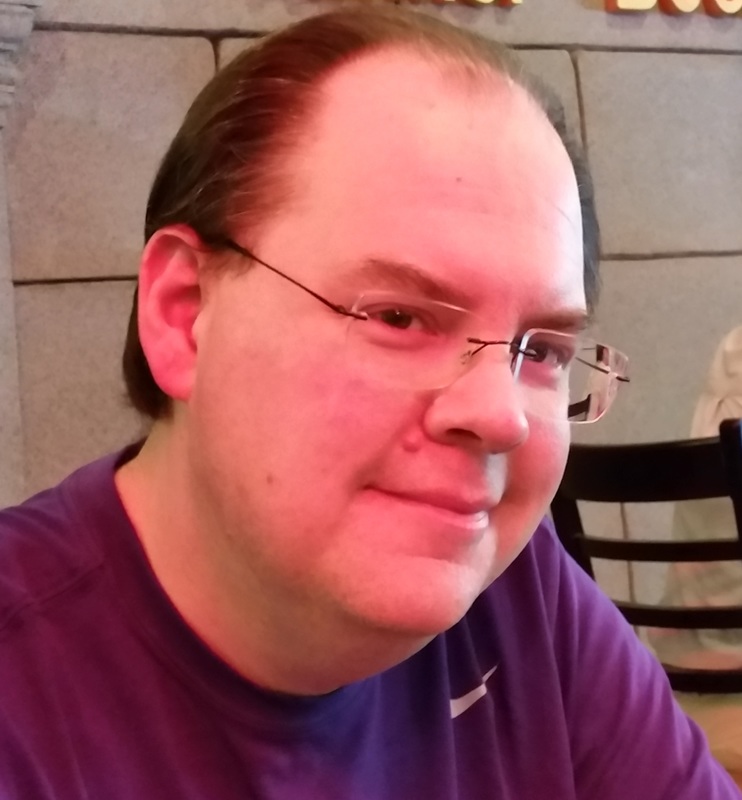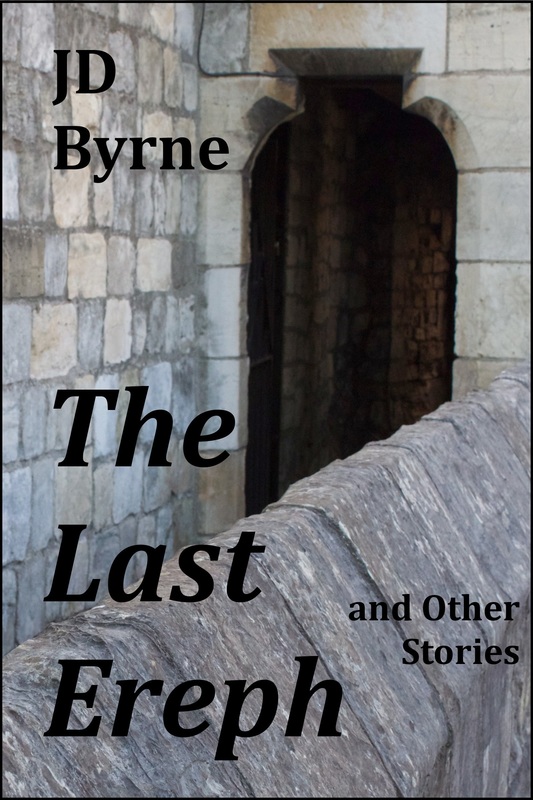I was born and raised in West Virginia, where I still live. My training is as a lawyer, but in that role I've been a writer (of briefs and other legal documents) for nearly 15 years. A few years ago I decided that I wanted to be able to write things over which I had a little bit more control, so I started writing fiction. I started with short stories, then played with some longer works, then came back to the short stories for my first book.
Tell us about your latest book.
The Last Ereph and Other Stories is my first book. It's a collection of ten science fiction and fantasy short stories. There's no common theme, aside from the fact that I wrote them all. Here are some specifics about a few of those stories.
“To Watch the Storms” was inspired by a thunderstorm that rolled through Richmond, Virginia, where I was staying at a hotel, getting ready to go to court. Even the average summer thunderstorm can hold untold wonders, if you’re patient enough to see them.
“The Dragon of the Bailey” is about a dragon who is being held captive, and who seizes help when it comes to him from an unlikely source. I wrote it after I read about the ravens kept in the Tower of London. Legend says so long as they stay there the kingdom will thrive, but they clip their wings so they can’t fly away. Seems like a stacked deck, to me. You can read a free excerpt from this story here.
“Jury Duty” is the only story that ties somewhat into my legal life. It’s about a guy who gets called for jury duty, finds a stumbling block, and runs with it. He gets dragged into court, required to be there, then finds out he isn’t modern enough to be a part of the trial. It was fun to be able to play around with a courtroom setting, given my day job.
In “the Missing Legion” a hunter in pursuit of big game stumbles into a ritual he was not supposed to see. This is set in the world of The Water Road, a fantasy trilogy I’m working on. Book one should be out early in 2016.
Finally, “The Last Ereph” is about a thief in a distant land. After stealing a precious gem, he seeks sanctuary and finds a treasure of an entirely different sort. You can read a free excerpt from this story here.
What do you have coming out in the future?
In the fall I'll have a novel coming out called Moore Hollow. It's set in West Virginia and plays off our reputation for creative election practices. A disgraced journalist from the UK, with a connection to West Virginia, comes to explore rumors that a desperate politician once tried to raise the dead so they'd vote for him.
What genre do you enjoy writing the most and why?
I write science fiction and fantasy, that occasionally gets snuggled up with horror. Like I said, in my daytime life I'm hemmed in by the facts of legal cases - things you don't dare make up. When it's time to write fiction I like to really like my imagination run away with things. I probably lean more toward fantasy than science fiction because of the absolute lack of boundaries when you're dealing with the fantastic.
From where do you draw your inspiration?
It's probably clichéd, but everywhere. I keep a running file of notes on my phone, so I can jot down anything - a word, a name, a description of a particular place - that I think might work in a story. On my computer at home I've got a Word file that goes on for pages that's just ideas collected in that way. I try and keep my eyes and ears open, try to look at things in the news and play the "what if?" game.
What kind of books do you like to read?
Do you read the genre you write for or do you prefer other genres?
I'm going to be overly efficient and answer these both at once!
Generally, I like to read the kind of stuff I like to write. So I mainly read fantasy and science fiction, and works that stray into those areas (I'm looking at you, Margaret Atwood!). When I was younger I was heavily into the Golden Age folks like Asimov and Clarke, plus the defining dystopias (Brave New World, 1984, Anthem). More recently I've given over to fantasy a lot - Neil Gaiman, George RR Martin. I've come lately to Ray Bradbury's short stories, too, which have been fun to dig into.
Having said that, I also try and dive into other fictional areas and non-fiction, too. I'm currently reading Billy Lynn's Long Halftime Walk, about a group of soldiers who get "treated" to a halftime show celebration after a particularly high profile firefight. Not speculative at all (sadly), but, so far, darkly humorous.
How have your real life experiences influenced your writing?
The old saw is write what you know, but how does that come into play with science fiction and fantasy? Like I said, I try to keep my eyes and ears open. Undoubtedly, there are things that have happened in real life that slipped into the pages of my stories. "Memory of Water" actually did start because I was having this series of stop start, very vivid, dreams. But that's all they were, in my case (or so I've been told!).
Kol runs down the corridor, agents of His Eminence hot on his heels. He needs escape, a way out, but all he sees is a heavy wooden door. Does salvation or capture lie behind it? In “The Last Ereph,” he finds the answer and more than he could have ever expected.
I read, naturally. In addition to books I spend entirely too much time reading blogs and web forums. I'm more interested in what people think and feel about something than the actual facts.
I also make music, under the name Infinity Ranch. It's electronic doodles, mostly (my wife hates it), but it's good fun. Creating musically is so different from writing, it feels more like harvesting ideas from the ether. There's more trial and error, I suppose.
Oh, and I practice law. That's what I do with most of my non-writing time.
What was your road to publishing like? Tell us about it.
I really wasn't thinking about publishing when I started writing. I had some grand dreams in my head of people reading what I was doing and becoming "successful," but I hadn't done anything thinking about it. It wasn't until after I had a couple of longer manuscripts finished that I really tried to figure out what the best fit was for me.
Ultimately, I decided to become my own publisher. A big part of it was I wanted to keep control over my work. Also, I hate having a "finished" product and not knowing what's going to happen to it. It keeps me from getting on with other things. With control over what is coming out and when, I can see the finish line for those projects and move on to other ones.
Besides, this is an exciting time to be a new author. Thanks to technology there's never been a better chance to connect directly with potential readers.
Have you joined any writer’s groups?
In the real world I've joined West Virginia Writers, Inc., which has been a really wonderful resource. In my experience, the best thing new writers can do is listen to what more experiences writers have to say. Not everything they've been through or say will be relevant to what you're doing, but more often than not it will. Being able to interact with other writers online and in the flesh has been a big part of my development.
In the purely online world I'm part of Critters.org, which is an online critique group for writers of science fiction, fantasy, and horror. That's been a huge help, not just in getting feedback on my own work but from critically reading the stories of others, seeing what works and what doesn't.
What is the hardest part of the writing process for you?
Getting started on a new project. I can plan and make notes all day long and once I get going I really work up some momentum, but there's something daunting about sitting down with a completely blank page (or screen). It's like in music where you try to figure out the right first note. Everything's open to you and the sheer amount of choice is overwhelming. Once the first note's down everything else flows from it. Same thing with writing. Once I have a paragraph or a page I'm good to go.
Which of your characters is your favorite and why?
In terms of main characters, probably Kalsis from the first story in the book, "Of That Alluring Fruit." She's curious, to the point of being obnoxious about it. She's only interested in truth, even if it leads her into trouble. I like to think there's a little of her in me (of vice versa, I suppose).
But my real favorites are ones that pop up out of nowhere when I need something for a story and didn't realize it. There's a character in Moore Hollow, an elderly woman, who provides some information to our hero. I hadn't really given her much thought until I got to that part of the book, but having to figure out not just how she functioned in the plot but who she was turned out to be a lot of fun. You can craft really interesting characters for the smallest of roles. I hope I can, anyway.
Do you have a careful plan when plotting your stories or do you just go with the flow?
Somewhere in between, I think. I'm definitely not the kind of writer who does a lengthy outline and knows where everything's going before I start (if I was, I might not have such a hard time starting!). But I don't really just fly by the seat of my pants, either. At the least, I like to have the main characters named and conceived before I get started. For novels and such I do that for more characters and probably sketch out some locations and ideas about what might happen. But for short stories, once I have an idea and a character I usually just go with it.
Having said that (there's always a catch), with longer works my first editing work is usually retyping the whole thing using the first draft as a guide. So you could argue that's the ultimate guideline, but I just call it editing.


 RSS Feed
RSS Feed
